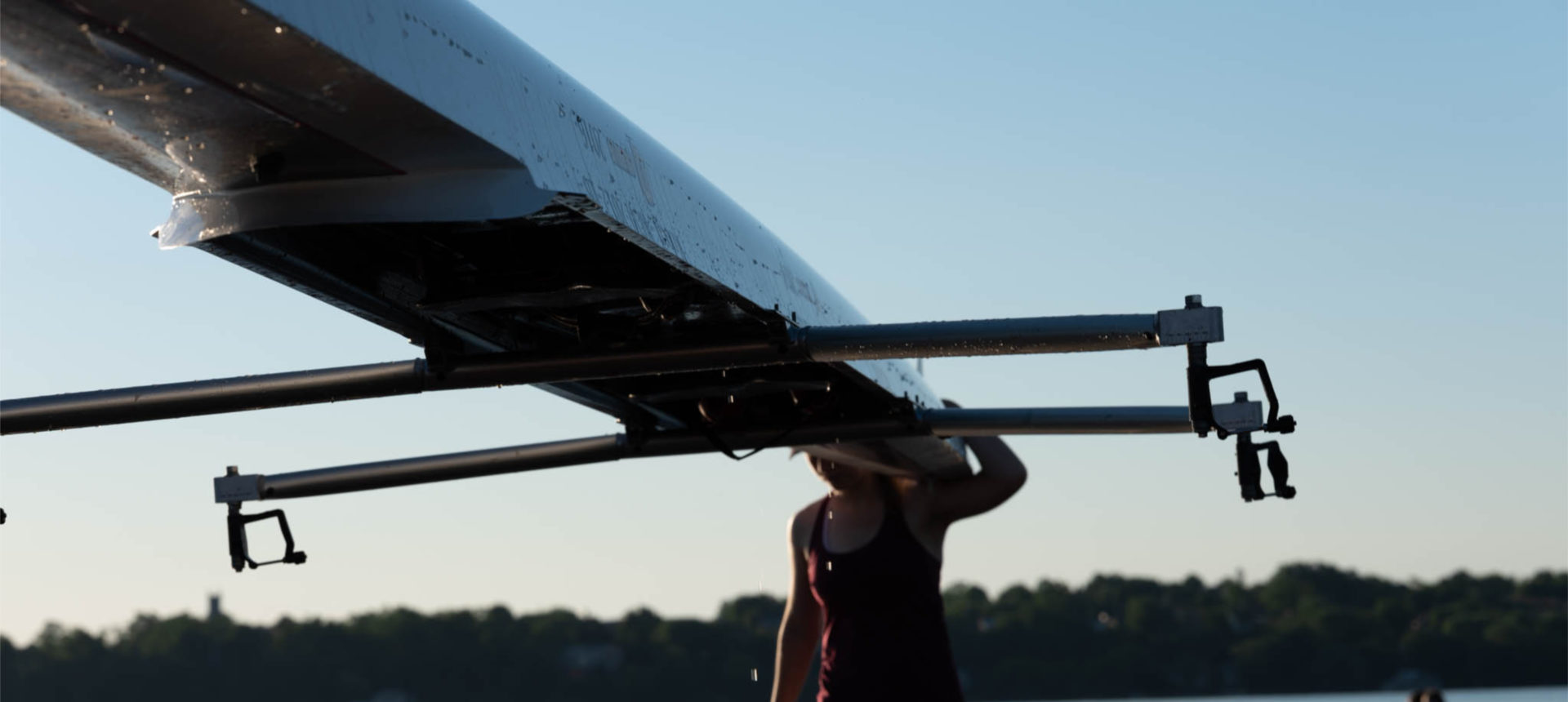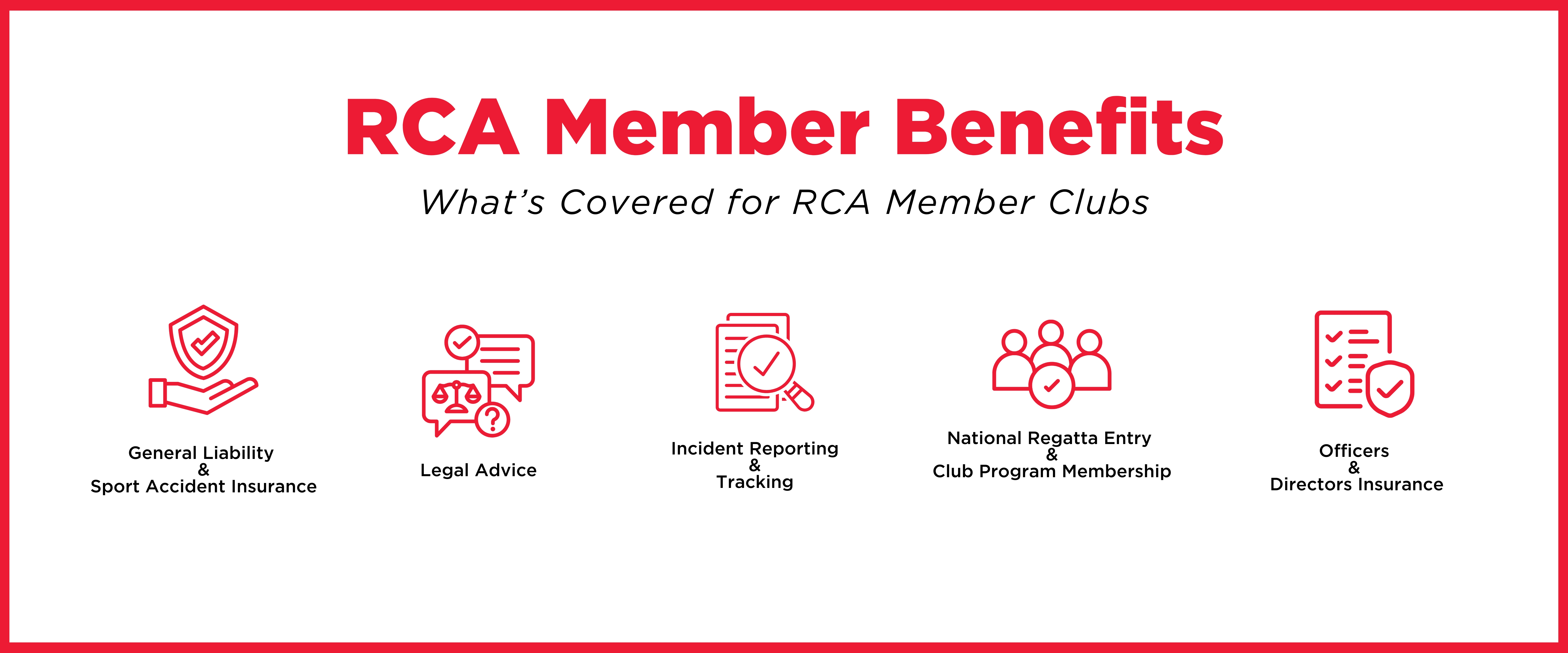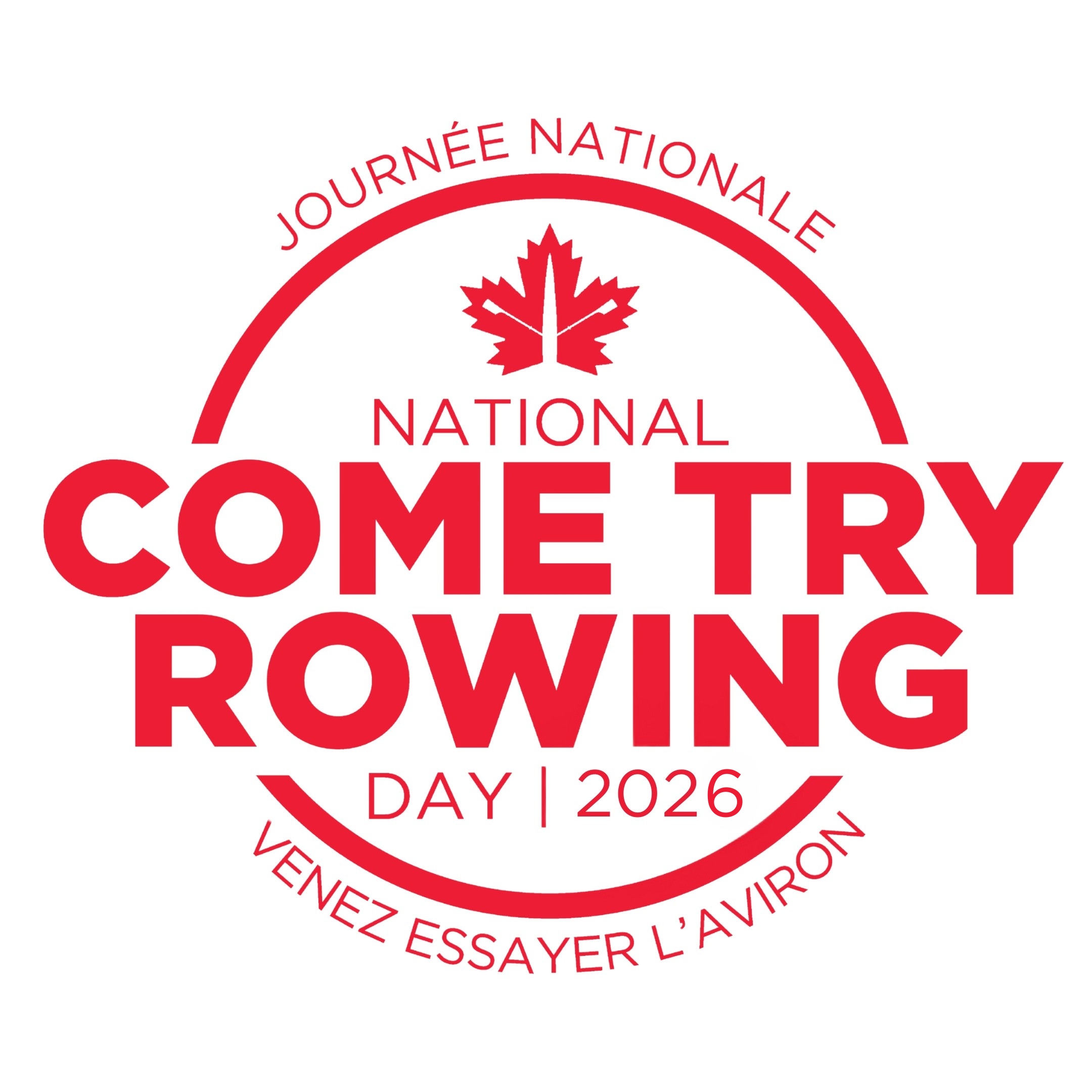
Members
Rowing Canada Aviron offers a number of services and development initiatives to support the growth of rowing in Canada. Check out information about how to become and remain a member of RCA, insurance and member benefits, safety requirements and guidelines, concussion guidelines, and athlete and club development resources.
What is an RCA Member?
RCA Member Organizations that provide programs, facilities or events to individuals participating in the sport of rowing on a local, regional or national level in Canada such as a Rowing Club, Provincial Rowing Association, or Special Association
RCA Member Benefits
Membership fees contribute to a small portion of the broader benefits available to all member organizations. These fees help support essential services, resources, and opportunities designed to enhance the overall experience, growth, and success of rowing within Canada.
While the fees play an important role in maintaining the organization’s operations, the full range of benefits—including networking, advocacy, and educational initiatives—are accessible to all members, ensuring that everyone can thrive and contribute to the community.

To understand how membership fees fit into the overall RCA Domestic Investment and Benefit breakdown, click HERE.
Become a Member of RCA
To become a member of RCA, organizations need to be a member of their Provincial Rowing Association (PRA).
The organization may then join RCA by providing:
- A copy of the organization’s legal information (letters patent or certificate of incorporation, constitution or by-laws) as approved by the applicable PRA
- A letter requesting membership in RCA including a brief history of the organization and the rowing venue if applicable
- Payment for the annual membership fee
- After your membership is approved, you will be eligible for RCA insurance and other member benefits
For more information, contact RCA Member Services Coordinator Alethia Clarke.
Registration, Dues and Fees
2026-2027 Dues and Fees
(April 1st, 2026 – March 31st, 2027)
-
Provincial Rowing Associations: $924.00
-
Special Associations and Associate Organizations: $664.00
-
Rowing Clubs: $529.00
-
Participant Fee: $39.75 ($31.75 Participant fee + $8 special investment fee)
-
Seat Fee: $4.65
-
Come and Try Fee: $75.00 ($5 per participant up to $75)
2025 Dues and Fees Webinar Video 2025 Dues and Fees Webinar Package
In accordance with the Rowing Canada Aviron (RCA) By-Laws, Members must register all those participating in club rowing and rowing-related activities to remain as RCA Members in good standing. All National Team, competitive, recreational, Learn to Row, corporate challenge rowers, umpires, coaches and club volunteers/administrators are required to register online through the RCA Web Registration System (WRS).
In January 2017, RCA Members voted in favour of a major shift in its Membership Model that took effect April 1, 2018. For background and information on the model, please review the initial report and the report presented at the 2017 Semi-Annual Meeting.
All non-rowers (Administrators, Club Presidents, Coaches, Directors, Umpires, Volunteers) must be registered in the RCA WRS. There is no RCA fee for non-rowers.
Individuals wanting to join a rowing club should visit our Find A Club section to learn more about programs available in their area. Registration for club programs is found online.

Annual Declaration
To remain a member in good standing, RCA Member Organizations must complete their Annual Declaration and pay their Annual Dues each year. Information about the upcoming Annual Declaration process was released in the spring of 2025.
To facilitate the voting registration process for the RCA Annual/Semi-Annual Meetings and to verify that members are in good standing prior to the regatta season, RCA is providing this Declaration Form as confirmation that all of your board of directors, participants, and coaches are entered in the RCA Web Registration System (WRS). A completed form is also required in order for your organization to be a member in good standing in the new registration year, April 1, 2025 to March 31, 2026.
This online form must be executed by a designated representative of your organization. The Declaration Form verifies that Members have registered all of their required roles and participants for the prior registration year (April 1, 2025 to March 31, 2026) with RCA and their respective Provincial Rowing Association – also a requirement for participation in sanctioned regattas (2.1 Definition of a Competitor, RCA Rules of Racing).
Yamaha Motor Canada Preferred Pricing for RCA Member Organizations
Yamaha Motor Canada offers preferred pricing on Yamaha Outboard Motors for RCA Member Organizations. The partnership between Rowing Canada Aviron and Yamaha Motor Canada will not disrupt any current relationship that may already exist between our RCA Member Organizations and local Yamaha Dealers.
RCA Member organizations interested in learning about pricing should have an official organization representative contact RCA for more details. Please do not contact Yamaha Motor Canada directly.
Learn more about Yamaha Motor Canada and outboard motors here.

Insurance
Rowing Canada Aviron provides its members liability insurance coverage for certain activities associated with rowing. Liability insurance will defend you and pay for damages that may be awarded against you. In short, insurance gives you peace of mind. It protects all members of the association as well as volunteers who might otherwise hesitate to offer their services from concern about their possible personal liability.
In addition, RCA provides accident coverage that pays defined amounts to any member who has suffered a serious injury as a result of an accident arising out of participation in our sport.
This Guide explains the nature of the coverage provided to members by RCA’s insurance policies and addresses some frequently asked questions. It also identifies some of the steps that members can take to minimize the risk of a legal suit.
For insurance certificate requests please complete the Insurance Certificate Request Form and submit the form via email to the attention of RCA Member Services Coordinator Alethia Clarke.
Contact the RCA Member Services Coordinator, Alethia Clarke, for insurance related questions: 1.877.722.4769 ext. 1; aclarke@rowingcanada.org.
Rowing Canada Aviron Insurance Information Guide Insurance Certificate Request Form Incident Report Form Insurance Claim Form Instructions
Rowing Canada Aviron Legal Expense Coverage
Rowing Canada Aviron insurance provides limited free legal advice for member organizations on an ongoing basis.
This section contains information about on-water safety and concussions. Please visit our Safe Sport page for more information about how to prevent and address maltreatment.
On-Water Safety
Individuals and rowing organizations have a shared obligation to ensure on-water safety remains paramount. In this section you will find a number of RCA requirements and guidelines in addition to resources we have compiled from agencies and other leading organizations.
Rowing Safely: RCA Safety Requirements & Safety Guidelines should be routinely reviewed by RCA member organizations to ensure adherence to requirements.
We have also created 6 self-paced interactive safety modules. These modules are applicable for new and returning rowers as well as all those in safety related decision-making roles (eg. club safety officers, coaches, umpires, etc).
RCA SAFETY REQUIREMENTS & GUIDELINES
Concussions
RCA believes that the welfare of everyone involved in our sport is a foremost consideration and has created a Concussion Management Policy to ensure the focus of each individual and member in the rowing community is always on long term health.
RCA’s Concussion Management Policy and associated procedures provide guidelines on how concussion education and management should be addressed at all levels of rowing throughout Canada. The policy addresses four key areas including Prevention and Awareness, Recognition and Removal, Assessment, and Return to Rowing. It aims to ensure that anyone in rowing with a suspected concussion receives timely and appropriate care with proper management to allow them to return to rowing safely.
Below are resources to support the rowing community in building awareness and education related to concussions as well as supporting the implementation of the RCA Concussion Policy.
Contact us if you want to learn more or have questions about implementing your own concussion policy and procedures.
RCA Concussion Management Policy (includes Concussion Recognition Tool)
Concussion Awareness Resources available through Parachute Canada
Return to Rowing Protocol
Safety Resources
Rowing Safely – Safety Requirements and Safety Guidelines
Safe Boating Guide
Transport Canada Collision Regulations
Transport Canada Small Vessel Regulations
Weather Protocol

Community Sport For All Initiative
RCA was the recipient of over $2.3M in funding from the Community Sport for All Initiative (CSAI) from Sport Canada. RCA distributes this funding to help support community-level rowing programs at clubs across the nation, provided training and development of CSAI leaders and created new resources for CSAI programming .
These programs have an organized sport active component, are delivered with minimal to no cost to the participants, and are tailored to an equity-deserving group, but not exclusionary.
RCA Member clubs have brought programming to over 8000 participants across Canada in 2022 and 2024.
Community Sport for All Initiative Funding

Come Try Rowing Events
A Come Try Rowing event is a promotional event hosted by a club or an association to promote rowing within their communities. First-time participants are invited to try rowing in a supervised and safe setting. Come Try events are:
- Promoted by clubs and associations to attract new people to our sport
- Typically 1 – 3 hours in duration
- Supervised by certified coaches
- Not races, regattas or training camps
To host a Come Try event, clubs need to register their event two weeks in advance. Clubs can request to host a Come Try Rowing event here.
Once Rowing Canada Aviron (RCA) approves the event it will be live in the Web Registration System (WRS) and will have a unique URL that is to be used for participant registration.
All participants should register through the WRS. During the registration process, participants will be required to complete the RCA waiver form. If it is not possible for a person to register through WRS, participants can complete a paper version of the waiver (Waiver | Assumption of Risk).
Clubs will be billed $5 per participant, up to $75. Come Try Rowing events can have more than 15 participants, at no extra charge. Within 7 days following the event, organizations must confirm their total number of participants to RCA. If RCA does not receive the list of participants within 7 days after the event, the organization will be billed $75.

Discover rowing with us during National Come Try Rowing Day!
In conjunction with the Provincial Rowing Associations and RCA Member Clubs across the country, Rowing Canada Aviron is hosting free, fun and safe introductory rowing sessions at local rowing clubs. These sessions will take place over the weekend of Friday May 29 – Sunday May 31, 2026.
Learn more about National Come Try Rowing Day HERE.
Inquiries related to Come Try events should be directed to Alethia Clarke.
Safe Sport
Rowing Canada Aviron (RCA) believes that everyone in rowing has the right to enjoy the sport at all levels of participation. Athletes, coaches, officials, umpires and volunteers have the right to participate in a safe and inclusive training and competitive environment that is free of abuse, harassment or discrimination – collectively referred to as maltreatment. The welfare of everyone involved in the sport is a foremost consideration and in particular the protection of children/athletes in the sport is the responsibility of each individual and member in the rowing community.
RCA recognizes that this is an evolving area of focus for all sports in Canada. Our Safe Sport program will continue to focus on education, prevention and response, all of which will be supported by strong governance, policies and procedures.
Safe Sport Information & Resources

Athlete Development
RCA Learn to Row Resources
Participant Handbooks
The Learn to Row Participant Handbooks are Rowing Canada Aviron’s effort to create concise, easy-to-use handbooks that provide beginning rowers with the foundational skills and information to begin rowing and embark upon a fulfilling recreational or competitive career as a rower.
PARTICIPANT HANDBOOK #1 PARTICIPANT HANDBOOK #2
Indoor Rowing Videos
Whether you’re new to rowing, coaching athletes, or running a training program, these indoor rowing videos are a great tool for developing efficient movement patterns and avoiding common mistakes. Covering key fundamentals, safety tips, and best practices, they’re designed to support skill development at any level.
On-Water Videos
These on-water Learn to Row video resources provide clear, step-by-step guidance to help beginners develop fundamental skills and confidence on the water. These videos are great for new rowers, useful for coaches looking to reinforce key techniques, and a helpful tool for clubs running Learn to Row programs.
RCA Athlete Development Pathway E-Learning Module
This RCA Rowing Essentials module (available on The Locker) will help you develop and refine your understanding of the RCA Athlete Development Pathway. If you are a coach wanting to collect one NCCP Professional Development Credit for completing this module, contact us.

Touring Guidelines
These Guidelines are intended to provide rowers, and those organizing rowing tours, with the information required to plan and undertake touring safely.
Touring is unlike rowing in racing shells. Touring often takes place on unfamiliar water. Waterways must be scouted in advance to ensure the safety and enjoyment of the tour. Organisers must be alert for potential problems and hazards. They must be familiar with the venue, weather patterns, currents, obstacles and all other potential hazards as well as the skill and fitness level of those likely to participate. Participants must be skilled and fit enough to row for several hours each day.
All safety equipment, spare parts and necessary tools must be accommodated in your touring shell. Docks will not always be available to facilitate a safe landing should the weather turn nasty. Boat captains and coxies must know how to make a beach landing, how to deal with a rocky shore, how to disembark at a dock higher than the boat’s riggers and how to disembark at a motorboat launch ramp.
